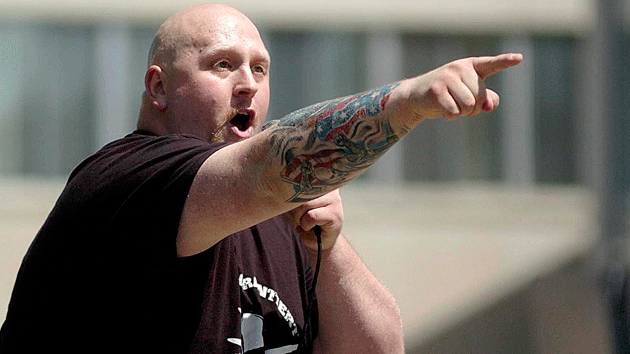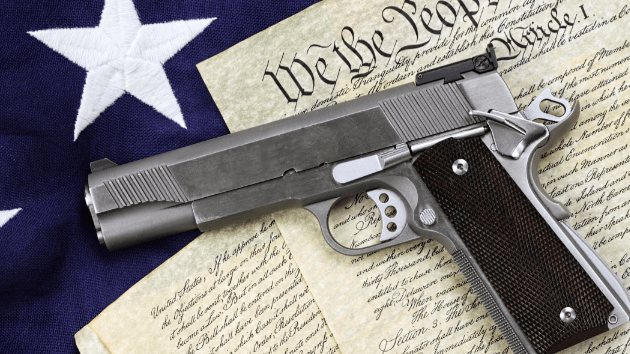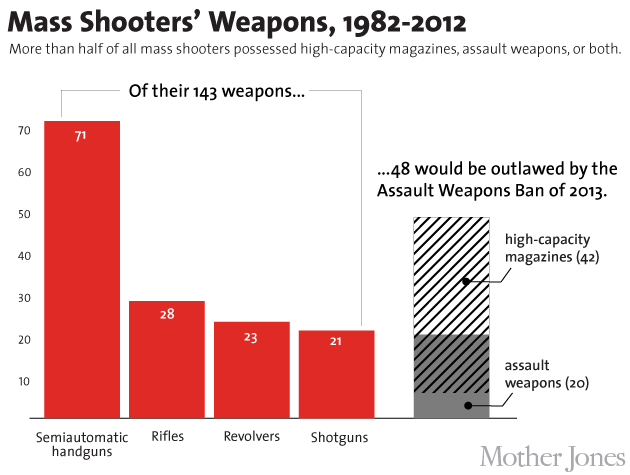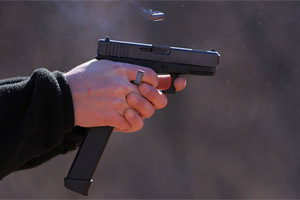
White supremacist Samuel Johnson at an anti-immigration rally he organized in 2010Eric Johnson/Austin Daily Herald
Samuel Johnson isn’t exactly a lawyer’s dream client. He’s a white supremacist with a lengthy rap sheet who a couple years ago was accused of plotting an attack on a Mexican consulate. He ended up drawing a 15-year prison term on a gun charge, and his case is now on his way to the US Supreme Court, which has agreed to hear a challenge to his sentence. Johnson has won the vocal backing of a top gun rights group, but as his case moves forward, it may eventually draw support from some liberals and civil libertarians who oppose harsh mandatory minimum sentences.
Johnson’s story started back in 2010, when he caught the attention of the FBI, not long after he’d started organizing anti-immigration rallies in Minnesota. Initially a member of the National Socialist Movement, a neo-Nazi group, Johnson quit to start his own outfit, the Aryan Liberation Movement. He allegedly planned to support the group by counterfeiting money.
During a domestic terrorism investigation, Johnson, who has a long criminal record, told an undercover informant he’d manufactured napalm, silencers, and other explosives for the new group, and was amassing a stockpile of semi-automatic weapons and ammo. According to court documents, Johnson and another man, Joseph Thomas, were planning an attack on the Mexican consulate in Minneapolis for May 1, 2012. Law enforcement swooped in before the attack could be launched. Thomas was arrested on drug charges and ultimately pleaded guilty to a meth possession charge and sentenced to 10 years in prison.
When he was arrested, Johnson admitted to possessing an AK-47 and a .22-caliber semi-automatic handgun, plus ammo for both—a big no-no given that, as a convicted felon, he was barred from owning weapons. A federal grand jury indicted Johnson for the illegal possession of weapons and ammo. Prosecutors also invoked another federal statute, which is at the heart of Johnson’s Supreme Court case. The Armed Career Criminal Act (ACCA), a Reagan-era tough-on-crime measure similar to California’s three-strikes law, exposed Johnson to a 15-year mandatory minimum sentence for the gun possession charges because he already had three previous violent felony convictions for robbery, attempted robbery, and possession of a sawed-off shotgun.
Johnson pleaded guilty to a single gun possession charge and was sentenced to 15 years in prison, a sentence even the judge admitted was too harsh for the crime at hand but one he was powerless to change thanks to the ACCA. (But for the ACCA, Johnson’s sentence would have been much shorter—between 7 and 11 years.) In his plea agreement, Johnson reserved the right to challenge the constitutionality of the ACCA in an appeal, which he did. He lost his case in the Eighth Circuit, but in April, without much fanfare, the US Supreme Court agreed to hear his case. In July, Gun Owners of America (GOA), a gun rights group even more die-hard than the National Rifle Association, threw in with Johnson and filed an amicus brief on his behalf with the court.
Larry Pratt, GOA’s executive director, concedes that Johnson isn’t a very sympathetic character. But he says that’s precisely why GOA got involved—to prevent Johnson’s unsavory background from detracting from the serious constitutional issues at stake in his case. “Nobody’s interested in defending the guy per se,” Pratt says. “In fact, if anything I resent him more because who he is could mess [the law] up for a lot of really innocent people. Bad cases make bad law.”
Oral arguments haven’t been scheduled yet, but a ruling in Johnson’s favor could have a big impact on federal gun prosecutions by limiting prosecutors’ ability to secure long prison sentences for relatively minor gun offenses. But a Johnson victory might also give civil libertarians reason to cheer a check on prosecutorial power.
In the Johnson case, the justices must decide whether simply illegally possessing a short-barreled shotgun constitutes a “violent” crime that could trigger the lengthy mandatory minimum sentence for a career felon. The federal law is vague on this front. The ACCA specifically lists some violent felonies that would cause the mandatory sentence to kick in: burglary, arson, extortion, and the use of explosives. But then it adds that the extra penalty can also be imposed if one of the three or more previous felonies involved “conduct that presents a serious potential risk of physical injury to another” and which are similar to those specific crimes laid out in the law.
It’s that last clause that’s created problems both for defendants and the courts. The lower courts have been all over the map in defining what constitutes the type of “violent” felony that would justify the extended sentence. Judges have deemed everything from purse-snatching, burglarizing an unoccupied commercial building, drunk driving, and fleeing the police in a vehicle as qualifying, not because theses acts are violent but because they could be. (The Supreme Court eventually disqualified the use of DUI but affirmed that fleeing the police in a car is a violent crime that could trigger extra years in prison.)
The courts have been especially inconsistent on whether Johnson’s crime, possession of a sawed-off shotgun, is worthy of a sentence enhancement. The government, the First Circuit, and the Eighth Circuit Court of Appeals, which ruled against Johnson, have said that illegal possession of a sawed-off shotgun meets the serious-risk standard Congress created. The Brady Center to Prevent Gun Violence also filed an amicus brief in the Johnson case supporting that position, citing research showing that the mere presence of an illegal gun increases the potential for violence.
Yet four other federal circuit courts have looked at the same question and come to the opposite conclusion, finding that simply possessing a short-barreled gun is a lot different from using it. Johnson, whose prior gun possession conviction came after he was caught riding in the front passenger seat of a car with a gun in a bag on the backseat, contends that his crime hardly rises to the level of the “purposeful, violent, and aggressive” crime the Supreme Court has said can trigger the mandatory minimum sentence.
Even so, more mainstream gun rights organizations haven’t jumped on the bandwagon to support Johnson so far. (The NRA’s legal shop didn’t respond to questions about whether it would file a brief in the case.) Given Johnson’s background, it’s not hard to see why gun enthusiasts might not be rushing to his aid. GOA, though, has no such qualms.
Pratt himself has been tied to white-supremacist groups, starting with his presence at the launch of the militia movement in the 1990s, at a meeting convened by a white-supremacist pastor. That said, in Johnson’s case, the radical gun group is on solid and potentially bipartisan ground. In fact, GOA makes arguments in its Supreme Court brief that echo liberal positions opposing the harshness of mandatory minimum sentencing and the excessive power it grants prosecutors.
Pratt is right when he says that the issues in the case have potential impact far beyond one white supremacist. The murky language in the ACCA has left the lower courts to define it on their own, with wildly different opinions resulting in vastly disparate sentences for defendants convicted of the same crimes. Pratt already has some supporters for his position on the high court, most notably Justice Antonin Scalia, who has blasted the ACCA as unconstitutionally vague.
Since 2007, the Supreme Court has taken four different stabs at trying to provide the lower courts more guidance on what sorts of crimes qualify as violent under the ACCA, most recently in 2011, in Sykes v. United States. Yet the lower courts’ decisions still are muddled, a situation Scalia predicted in a scathing dissent in Sykes. He wrote that instead of clarifying the law, the decision would only “sow further confusion,” and that the court’s jurisprudence in this area met the definition of insanity: “doing the same thing over and over again, but expecting different results.”
“Four times is enough,” he wrote, arguing the law should be declared void for vagueness. He went on to not only criticize the court but the members of Congress who wrote the imprecise criminal statute in the first place:
Fuzzy, leave-the-details-to-be-sorted-out-by-the-courts legislation is attractive to the Congressman who wants credit for addressing a national problem but does not have the time (or perhaps the votes) to grapple with the nittygritty. In the field of criminal law, at least, it is time to call a halt.
His colleagues ignored him, and not long after, refused to hear four more cases involving the ACCA. Scalia once again criticized them for leaving lower court judges to translate the law on their own, writing:
Conceivably, they will simply throw the opinions into the air in frustration, and give free rein to their own feelings as to what offenses should be considered crimes of violence—which, to tell the truth, seems to be what we have done. (Before throwing the opinions into the air, however, they should check whether littering—or littering in a purposeful, violent, and aggressive fashion—is a felony in their jurisdiction. If so, it may be a violent felony under ACCA; or perhaps not.)
Scalia’s view on the ACCA doesn’t ensure a slam dunk for Johnson (or GOA), however. The Brady Center’s Jon Lowy notes that Johnson is “someone we should agree deserves very stiff punishment.” He says Johnson illustrates that the law is working as intended by ensnaring “exactly the people who should not have their hands on their guns.”
And then there’s the court’s recent record in gun cases. While in 2008 and 2010 the court issued landmark decisions enshrining the individual right to bear arms, overturning strict gun control laws in DC and Chicago, since then, most of its decisions have gone against the gun lobby. Lowy says that in three cases in which the Brady Center has filed amicus briefs in the past year, it has prevailed, and the court has declined to hear a host of other cases where lower courts have upheld various gun control statutes.
Still, he declines to speculate about the outcome in Johnson’s case. “There’s always concern that the court picked [a case] for what in our view are the wrong reasons,” he says. But over the past year, despite fears that the court would continue to chip away at existing gun control laws, the justices have come down firmly on the side of gun violence prevention. “We’re hopeful that this one is one of those.”















